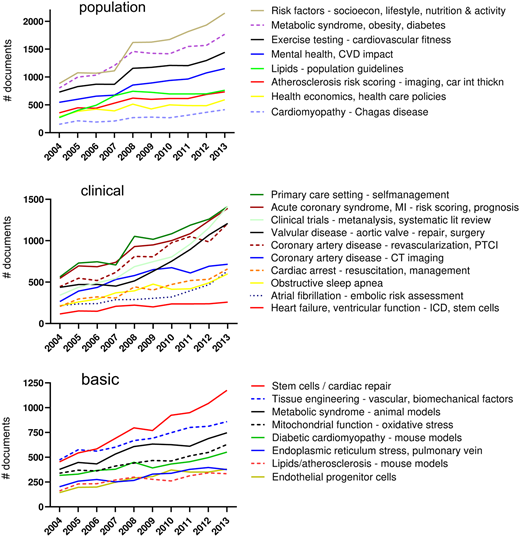The European Heart Journal published a big data study that analyzed 478,000 articles from 5,000 journals from 2003 to 2014 and found that inflammation, biomarkers, metabolic syndrome, obesity and blood lipids are the subject of research throughout the cardiovascular field.
The researchers identified and labeled 175 research topics. The article is divided into population research, clinical research and basic research.
The study found that clinical and population research has grown substantially, while basic research has decreased.
The authors believe that research is increasingly focusing on improving patient outcomes, risk stratification and prevention through new treatments.
The study also found that evidence-based treatment, clinical study results and prognosis, cardiovascular disease epidemiology and risk factors in population studies have increased significantly since 2004 (see chart below).
In population studies, cardiovascular disease risk factors, as well as socioeconomics, lifestyle, nutrition and physical activity, increased the fastest.
In clinical studies, the risk scores and prognosis of primary cardiovascular disease prevention and self-management, as well as acute coronary syndrome, were the fastest.
The "hot" topic also includes new therapies for valvular and coronary artery disease as well as imaging.
In basic research, stem cell/myocardial repair and tissue engineering (vascular, biomechanical factors) papers have the largest increase.

The study also found that US papers accounted for more than 30%, ranking dominant, followed by Germany, the United Kingdom or Italy.
However, in 2011-13, Chinese papers accounted for 17.5% of gene and stem cell research.
In addition, transformation and innovation redefine basic research in cardiovascular disease. Over time, basic research articles have decreased, but stem cell and tissue engineering research and transformational research have all grown substantially. Cell signaling and gene transcription are central topics in basic research.
Researchers point out that medical needs, funding and publishing policies, and scientific opportunities are potential drivers of these developments.
buy capsule online now.


